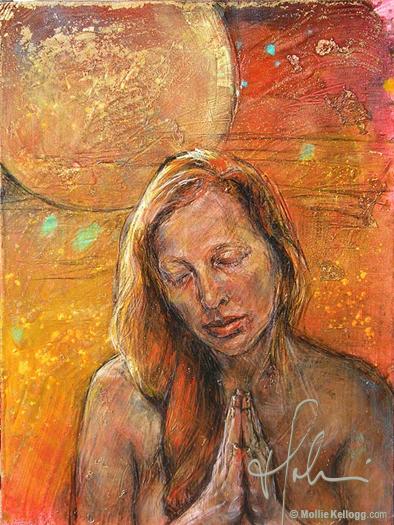Humility
‘Namaste’
is an act of humility
With
humility, we gain wisdom
See
humility in nature
Trees
bending in the harsh wind
Just
seem to me as if
They
are asking for
Forgiveness
on
Behalf
of
All
of
Us.
It
Reminds
Me
of lord
Jesus
Christ who
Suffered
pain for our
Sins
so that we all could
Be
forgiven and live a
Better
life, even the raging
Fire
bows down to water in defeat
Showing
reverence and humility!
‘Humility’ to me doesn’t mean low
Unity
comes with humility I believe
Malice
and conceit have to be destroyed
In
order to live a sublime life.
Little
things do matter a lot
I
believe, like saying
Thank
you, hello or hi
You must be humble
to survive!
(NOTE:
Poetry forms used are Double Reversed Etheree and Acrostic)

Namaste -- Mollie Kellogg
“Nama” means bow, “as” means I, “te” means you – “I bow to you.” Yoga practitioners place their hands together at the heart chakra, palms touching and fingers pointing upwards, close their eyes, and bow their head slightly as an acknowledgment of the soul in one by the soul in another. It may also be performed by placing the hands together in front of the “3rd eye” above the nose, bowing, and bringing the hands down to the heart. It is used for salutation and valediction. In India the gesture speaks for itself and is generally unspoken, but in the West the word is usually verbalized.
ReplyDeleteEtheree Taylor Armstrong is credited with inventing the progressive syllabic verse form called an "etheree." It is a 10-line unrhymed poem; the 1st line has 1 syllable, the 2nd has 2, and so forth. Judi Van Gorder's poem, "Etheree," demonstrates its form:
One
subject
to explore
within ten lines,
each avoiding rhyme.
Sequential syllables,
numbers run from one to ten
creating a staircase of words
for the expectant reader to climb.
A popular verse from the internet.
A reverse etheree has 10 syllables in the 1st line and ends with a single syllable in the 10th; a double etheree begins with 1 syllable, works its way up to 10, and then works its way back down to 1 in the 20th line.